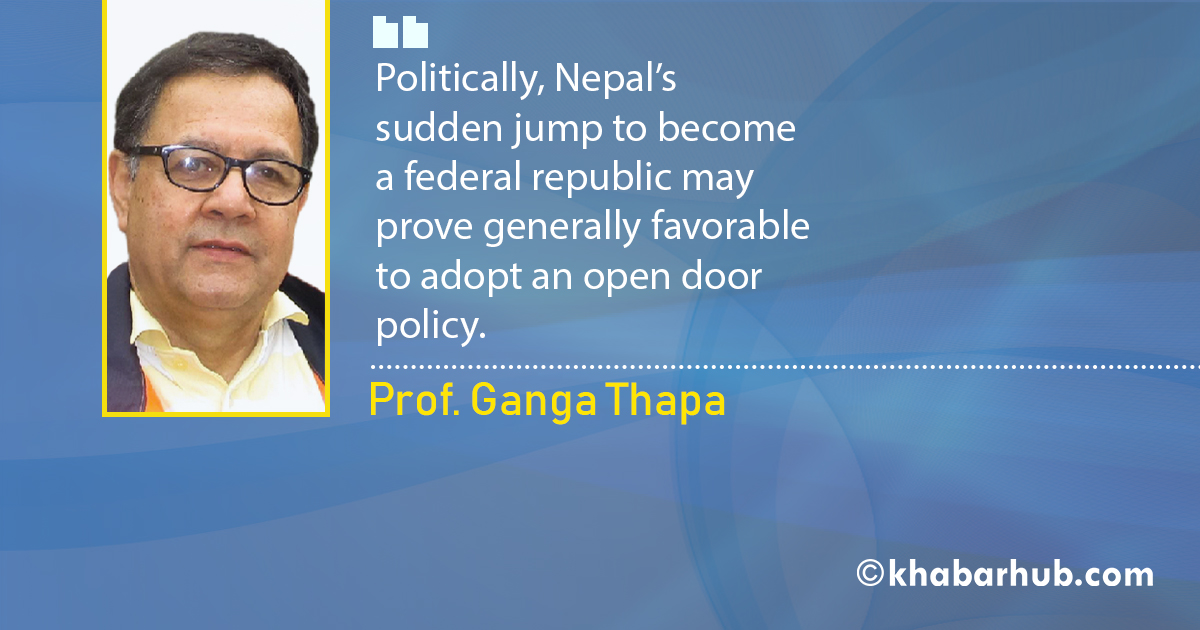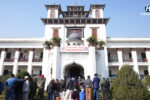Nepal has a new democracy without having been established as an effective control mechanism. So, we must not expect a lot to achieve too soon unless people actively play significantly positive roles. And without that, it will be very difficult to adhere to democratic ideals and achieve democratic governance.
Politically, Nepal’s sudden jump to become a federal republic may prove generally favorable to adopt an open door policy. Plato had observed that necessity is the mother of invention. Still, there would be problems to realize benefits from freshly adopted economic reforms and strategies to usher in a new era of expanding the institutional base, especially when we must ride over the burden of the past and search for new approaches for the present and the future as an unavoidable need with sincerity.
What is occurring at present in Nepal may not be in conformity with the concept of politics advocated by the first generation of post-Rana public leaders, which was, in a way, short-sighted and deficient with serious social, economic and political shortcomings.
The prospect of democratic consolidation in the current unpredictable environment and uncontrollable political context constitutes a painful challenge; yet, there be no need for failures in the tenth year of the regime. Perhaps, the most salient feature of our discussion is that democracy requires ‘mutual acceptance and recognition of differences; it is remarkably pertinent that democracy, market economy, secure human rights, and egalitarianism together build the route to prosperity, but democracy must have its roots firmly set up to ensure its stability (Lipset 1959). Following Lipset’s hypothesis ‘wealth sustains democracy’ there is a strong emphasis on incomes increase in societies are more likely to become more democratic, and a potentially effective mechanism for building peace, actively promote their institutions and improves relations with other countries.
What is occurring at present in Nepal may not be in conformity with the concept of politics advocated by the first generation of post-Rana public leaders, which was, in a way, short-sighted and deficient with serious social, economic and political shortcomings. However, the key elements of democracy have been significantly eroded in the absence of devolution of authority via innovative activity, political institutions, and, most importantly, changes in the mentality of the political leadership and the people as well while concerning the polity and economy of the country.
Despite having accomplished a profound political change and demonstratively laying a solid foundation to decentralize power through constitutional means, which was nothing less than harnessing a political earthquake, economic stagnation and old political thinking continue to linger. It is widely believed that political power is concentrated among the organized interests that erode and undermine the prospects for economic development, affecting the political impact negatively to take the lead for consolidating federalism, which has even brought the resilience of Nepali democracy into question.
Yet, what we see is a mere symbolic representation since the politicians tend to make pledges on an issue that has the potential of sensitizing masses than picking up questions of genuine public interests to establish an equitable society of 21st century without disregarding internal considerations of utmost significance.
Notwithstanding the constrained views, Kathmandu has a lot to achieve politically since international activism continues to have profound leverage to influence policy outcomes that eventually prove burdensome for Nepal to look after its political interests; the situation clearly indicates that Nepal is confined to a set of normative questions in order to overcome the what-to-do-with-the-given situation.
In practical terms, we must get rid of demographic, socioeconomic, political, cultural, and other factors as observed above that have been obstructive to materialize a modern democracy, particularly due to the Herculean task to achieve mature federalism amid the climate of old habits which in public rhetoric appear to be playing a somewhat subversive role.
Yet, what we see is a mere symbolic representation since the politicians tend to make pledges on an issue that has the potential of sensitizing masses than picking up questions of genuine public interests to establish an equitable society of 21st century without disregarding internal considerations of utmost significance.
There is a saying that one sure way to look into the uncertain future is to look back. The Nepali polity in perspective seems to be heading toward multilevel governance. However, a systematic discussion of the principal aspects of federalism indicates that the steering role of political institutions and responsibilities in meeting the internal and external challenges to the state remains blurred. At the same time, the evidence we have so far would suggest that the seeds of new political patterns had started to emerge soon when the old regime had died down and that may be regarded important and intrinsically valuable in the process for successful institutional designs that such process can also serve to articulate general interests of the community.
Besides, we also find opening up of debates on federalism that makes an important contribution to refresh and resolve the nagging regional issues, which has been remarkably receptive at large, although the long journey just began would not be completed without having democratic equality and without devoting some time toward the role of internal politics and work done by political actors.
From the perspective of politics, it is hardly strange that federalism is a framework to represent economically backward minorities and marginalized sections of the society; it is seen as a panacea to social inequality and a mechanism to integrate them into the government spaces in the long-term and to create new interpretative means to advance the quality of democracy that we have.
Besides, it is taken as indispensable to create new forms of community, to cultivate shared interests and social cohesion, and to ensure solidarity with considerable political activity and improved governance that recognizes a transparent, accountable, and participatory polity to continue to flourish. Our findings also reveal that, on the average, the Nepali Constitution provides for several innovative features with respect to the opportunities provisioned for an inclusive entity in which the interests of all the groups may be accommodated, enabling them to manipulate the political system and gain access to power.
In all probability, the presence of organized social involvement and citizens’ higher political engagement in a democracy will reduce the schemes of potential saboteurs to subvert the new regime. Yet, the challenge for democratic stability remains, especially when there is an emerging consensus that it is instrumental for economic development. Indeed, there are shortcomings in the actual operation in order to achieve the policy goals due to the lack of innovative tools which would help understand better and explain effectively the ways through which the political thinking is represented and the rules of the game have adhered demonstratively.









Comment